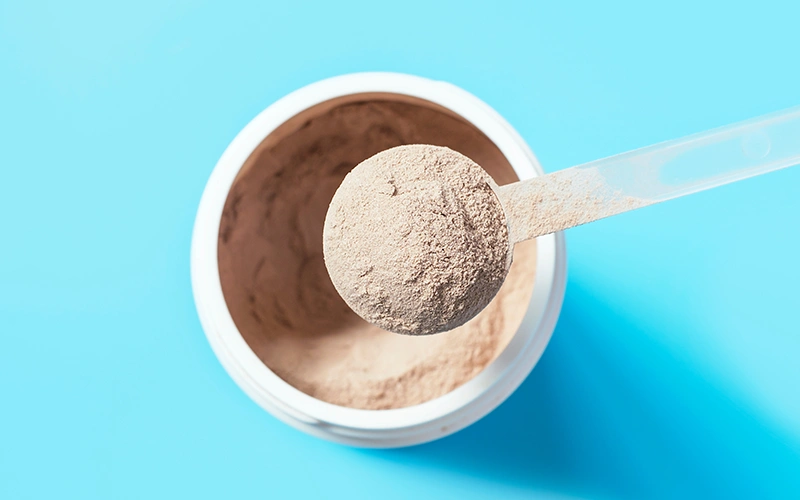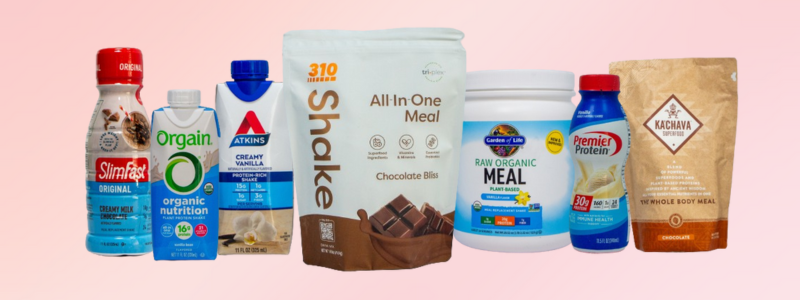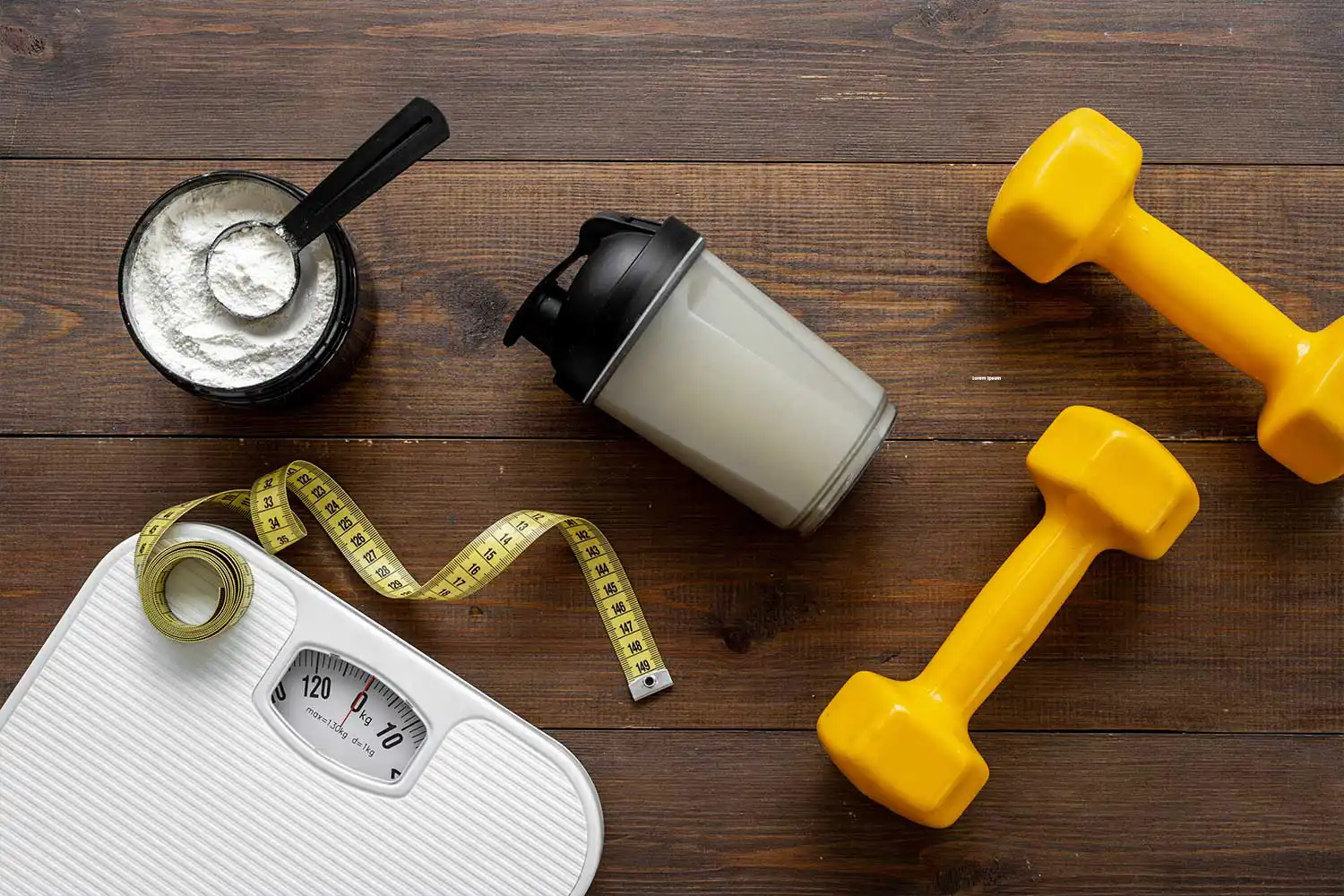We know you’ve been there (because we have to!). You’ve...
We’re all busy these days, right? And, sometimes, in an effort to squeeze all that we can into our daily schedules, we end up making compromises — including with our food. Meal replacement shakes, in particular, are a solid option when we’re pressed for time because they promise a day’s worth of nutrition in just one drink. But is it really wise to continuously skip regular meals and exist entirely off of meal replacement shakes? In this article, we’ll explore some of the pros and cons of meal replacement shakes, but first, let’s learn a little more about them.
Meal Replacement Shakes: A Brief Overview
Meal replacement shakes are drinks that are easy to whip up in place of a regular meal. They promise to give you all the good stuff: proteins, carbs, fats, and those all-important vitamins and minerals. The idea is to offer a no-fuss alternative for weight-loss journeys, muscle-building missions, or days when the stove is a no-go.
Can Meal Replacement Shakes Help You Lose Weight?

According to one study, meal replacement shakes can definitely be helpful tools for those tackling weight loss or obesity [1], because they make it easier to count calories and can prevent us from overeating. Plus, they’re a handy way to curb your hunger while you’re on the go, so that you’re less likely to grab a burger and fries from your favorite fast-food joint.
But are meal replacement shakes really the panacea for a time-starved and out-of-shape population? In short, if you’re thinking about losing weight, shakes can help. But remember to balance them out by eating healthy foods, too, and keep in mind that regular exercise is also an essential part of a weight-loss plan. If you’re interested in adding meal replacement shakes to your diet, talk to your doctor or healthcare practitioner to see what’s best for you.
Can You Live On Meal Replacement Shakes Alone?
While the nutritional profiles on some of these meal replacement shakes might have you thinking that you could sip your way through life, let’s be real: these shakes can only replace some of our meals. Not every shake out there is a nutritional powerhouse. Some are protein-packed but might skimp on other vital nutrients that only whole foods can provide.
What’s more, our bodies were built to munch, crunch, and digest a variety of foods, so sticking to a liquid diet can mess with our system in a myriad of ways. Diets like these could also have a negative impact on our social lives over time, as well. Imagine having to sip on your shakes during Sunday BBQs, Thanksgiving dinners, or a dinner out with friends? Food is more than fuel: it plays a big role in our memories, culture, and bonding. So, while having a shake now and then is OK, it’s best to eat a diet that consists of regular food most of the time for overall health and wellness. Here are some other important factors to consider:
Digestion
Meal replacement shakes, lack fiber and whole foods, affecting your stomach and digestion. In the short-term, they might be gentle on your stomach and ease any discomfort. But in the long run, insufficient fiber from real foods can lead to digestive issues like constipation.
Phytochemicals and Antioxidants
Whole foods, such as fruits and vegetables, contain a variety of phytochemicals and antioxidants that have numerous health benefits. These compounds can promote well-being and help protect the body from chronic diseases. By relying solely on meal replacement shakes, you miss out on these valuable phytochemicals and antioxidants, which are not typically present in the same quantities or diversity in processed shakes. Incorporating a variety of fruits and vegetables into your diet can enhance your long-term health by providing a wide range of these beneficial compounds.
Satiety
One of many interesting facts about meal replacement shakes is that it can provide a quick and convenient source of nutrition, which can be beneficial in certain situations, such as busy mornings or post-workout recovery. They often contain protein, which can help with satiety, making you feel fuller longer. However, the simplicity of liquid meals might not satisfy your cravings or emotional needs associated with food. Real meals offer a sensory experience involving taste, texture, and aroma, which can positively impact your overall satisfaction and relationship with food. In the long-term, relying solely on shakes for satiety might lead to a lack of fulfilment and a desire for more varied and enjoyable eating experiences, potentially contributing to overeating when you return to solid foods [2].
How to Use Meal Replacement Shakes Effectively?

As we’ve mentioned, meal replacement shakes can be a smart way to manage weight or consume essential nutrients on a busy day. But to ensure they don’t become a setback, it’s vital to find the best meal replacement shakes and use them correctly. Here are some strategies to get you on the right track:
Pick a Quality Shake: Not all meal replacement shakes are the same. Look for ones with good protein, vitamins, and minerals. Avoid ones with too much sugar or stuff you can’t pronounce.
Don’t Skip Meals: Use the shake as a “replacement.” So, if you normally eat breakfast but are in a hurry, have a shake instead.
Balance with Real Food: Shakes can help, but you still need regular food. Eat fruits, veggies, and other healthy foods during the day.
Watch Portions: Just because it’s a shake doesn’t mean you can have as much as you want. Follow the serving size.
Stay Active: Shakes can help with diet, but exercise is important too. Walk, run, dance, or do something you love.
Stay Hydrated: Drink lots of water throughout the day, not just shakes.
Listen to Your Body: If you feel hungry or not good, your body is trying to tell you something. You may need more food, or maybe your body might need a different type of shake.
Talk to a Pro: Before starting any diet, make sure you talk to a doctor or nutritionist. They can help steer you in the right direction.
FAQs
Are Meal Replacement Shakes Safe?
Meal replacement shakes are designed to provide the nutrients found in a full meal. However, not all shakes are created equal. It’s important to read the label. Look for shakes that are free from excessive sugars, artificial ingredients, and fillers. While these shakes can complement your diet, they shouldn’t be your only source of nutrition.
How Many Shakes Should I Have Each Day for Weight Loss?
Incorporating one or two meal replacement shakes can be beneficial if you aim to shed some weight. They can provide a controlled number of calories and nutrients. However, you must continue to consume regular, solid meals. These meals should be rich in vegetables, lean proteins, and healthy fats.
How Many Shakes Should I Have Each Day for Healthy Weight Gain?
If you want to gain weight in a healthy manner, you might need a higher calorie intake. Two to three shakes, in addition to regular meals, can be beneficial. However, ensure these shakes are nutritionally balanced and not just loaded with sugars. And, as always, your primary focus should be on consuming nutrient-rich whole foods.
Is It Safe To Consume a Diet of Only Meal Replacement Shakes?
Long-term reliance on just shakes isn’t recommended. While meal replacement shakes can be nutrient-packed, they can only partially replicate the diverse range of nutrients and benefits from a varied diet of whole foods. Over time, a shake-only diet might lead to certain nutrient deficiencies and potential digestive issues.
What To Look For in a Meal Replacement?
When shopping for a meal replacement shake, there are a few key things to consider. Prioritize shakes with a good protein, carbohydrate, and fat balance. Check the sugar content and avoid those that are excessively sweetened. Vitamins and minerals are crucial, so ensure the shake offers a good range.
Final Thoughts
Meal replacement shakes can be handy when we’re rushing. They’re a quick way to give our body some of what it needs, but they can only give us some things. The best meal replacement shakes try to pack in a lot of nutrients, but nothing beats a nutritious meal with whole foods. Plus, eating food is about more than just being full. It’s also about enjoying what we eat and spending quality time with loved ones.
Sources
[1] Min, J., Kim, S. Y., Shin, I. S., Park, Y. B., & Lim, Y. W. (2021). The Effect of Meal Replacement on Weight Loss According to Calorie-Restriction Type and Proportion of Energy Intake: A Systematic Review and Meta-Analysis of Randomized Controlled Trials. Journal of the Academy of Nutrition and Dietetics, 121(8), 1551–1564.e3. https://doi.org/10.1016/j.jand.2021.05.001
[2] Bowen, J., Brindal, E., James-Martin, G., & Noakes, M. (2018). Randomized Trial of a High Protein, Partial Meal Replacement Program with or without Alternate Day Fasting: Similar Effects on Weight Loss, Retention Status, Nutritional, Metabolic, and Behavioral Outcomes. Nutrients, 10(9), 1145. https://doi.org/10.3390/nu10091145
[wptb id=5842]RV Team
Related Articles
Best Meal Replacement Shakes for Weight
Meal replacement shakes for weight loss are specially formulated nutritional...
How to Use Meal Replacement Shakes
Meal replacement shakes are basically those handy-dandy drinks that come...
Can Meal Replacement Shakes Help You
Can Meal Replacement Shakes Help You Lose Weight? Meal replacement...
* Reviewology is in partnership or collaborates with top brands highlighted on this site, including those occupying the top ranking positions.
Additionally, we earn affiliate commissions from products showcased on this website when you make a purchase through the provided links on Amazon or the company website directly.
We appreciate your support using our links to purchase your favorite brands or newly discovered brands.
Latest updates
I Thought I’d Always Feel Tired, Fat, and Forgotten—Until This
310 Greens vs AG1
The Truth About 310 Greens: A No-Nonsense Review of This Popular Supplement
Popular
I Thought I’d Always Feel Tired, Fat, and Forgotten—Until This
310 Greens vs AG1
The Truth About 310 Greens: A No-Nonsense Review of This Popular Supplement
© 2024 Reviewology. All Rights Reserved.




